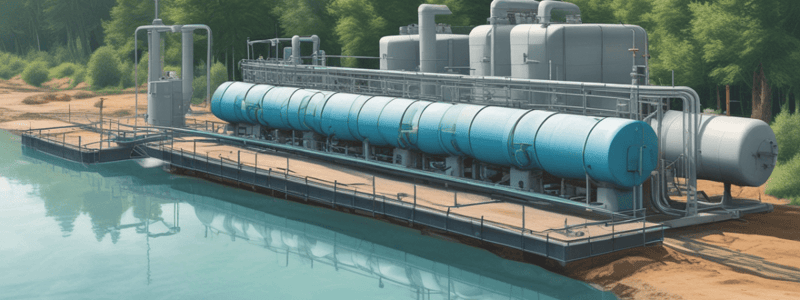Podcast
Questions and Answers
What is the purpose of the filter systems in schools?
What is the purpose of the filter systems in schools?
- To store water for cleaning
- To remove solid particles from the water
- To cook food in the kitchens
- To provide drinking water for students and teachers (correct)
How often is water added to the filters each day?
How often is water added to the filters each day?
- Four times a day
- Three times a day (correct)
- Twice a day
- Once a day
What is the daily capacity of each 55-gallon drum filter?
What is the daily capacity of each 55-gallon drum filter?
- 100 liters of water
- 150 liters of water
- 250 liters of water
- 200 liters of water (correct)
What is the purpose of disinfecting the water in the treatment process?
What is the purpose of disinfecting the water in the treatment process?
What is one method of disinfecting water, according to the text?
What is one method of disinfecting water, according to the text?
What is the largest religious denomination in Tanzania?
What is the largest religious denomination in Tanzania?
What percentage of Tanzania's GDP does agriculture represent?
What percentage of Tanzania's GDP does agriculture represent?
What are the primary agro-ecological zones in Tanzania?
What are the primary agro-ecological zones in Tanzania?
What is the main source of food, industrial raw materials, and foreign exchange earnings in Tanzania?
What is the main source of food, industrial raw materials, and foreign exchange earnings in Tanzania?
What is the mission of Maji Safi Group?
What is the mission of Maji Safi Group?
What is unique about Maji Safi Group's approach?
What is unique about Maji Safi Group's approach?
What is the core of Maji Safi Group's education philosophy?
What is the core of Maji Safi Group's education philosophy?
What is necessary to fully realize the benefits of having access to an improved drinking water source?
What is necessary to fully realize the benefits of having access to an improved drinking water source?
What is WASH an acronym for?
What is WASH an acronym for?
What is a major factor influencing farmers' choice of crops in Tanzania?
What is a major factor influencing farmers' choice of crops in Tanzania?
What is affected in all areas of the community due to unsafe water, poor sanitation, and unhygienic practices?
What is affected in all areas of the community due to unsafe water, poor sanitation, and unhygienic practices?
What is a specific challenge faced by women due to the WASH crisis?
What is a specific challenge faced by women due to the WASH crisis?
What percentage of Tanzania's population is rural?
What percentage of Tanzania's population is rural?
What is the purpose of Maji Safi International LLC's slow sand filter?
What is the purpose of Maji Safi International LLC's slow sand filter?
What is added to the water after treatment by a filter?
What is added to the water after treatment by a filter?
What is the time required for the water to be ready to drink after adding chlorine?
What is the time required for the water to be ready to drink after adding chlorine?
Who is the founder of Maji Safi International LLC?
Who is the founder of Maji Safi International LLC?
What is unique about Maji Safi International LLC's slow sand filter?
What is unique about Maji Safi International LLC's slow sand filter?
What is the purpose of the water collection plate in Maji Safi International LLC's slow sand filter?
What is the purpose of the water collection plate in Maji Safi International LLC's slow sand filter?
What is the material used to make the point-of-use slow sand filters?
What is the material used to make the point-of-use slow sand filters?
What is the primary method used to disinfect water according to the content?
What is the primary method used to disinfect water according to the content?
Who has been instrumental in the Maji Safi water filter initiative?
Who has been instrumental in the Maji Safi water filter initiative?
Which of the following is a key component of the Maji Safi Group's approach to improving water safety?
Which of the following is a key component of the Maji Safi Group's approach to improving water safety?
What percentage of Tanzania's population is literate as noted in the content?
What percentage of Tanzania's population is literate as noted in the content?
What is stated as a prerequisite for the realization of all other human rights?
What is stated as a prerequisite for the realization of all other human rights?
What is the estimated life expectancy at birth for males in Tanzania?
What is the estimated life expectancy at birth for males in Tanzania?
Which of the following is the capital city of Tanzania?
Which of the following is the capital city of Tanzania?
What is the primary religion demographic in Tanzania?
What is the primary religion demographic in Tanzania?
Flashcards are hidden until you start studying
Study Notes
Water Treatment for Drinking
- Essential steps in river or surface water treatment: removal of solid particles and disinfection
- Disinfection methods include boiling (heat) or chemicals like iodine and chlorine
- Chlorine is recognized for its effectiveness in saving lives
Human Right to Water
- Clean water is fundamental for life and health; recognized as a human right by the United Nations
- Access to clean water is a prerequisite for realizing other human rights
Maji Safi Water Filter Case Study
- Located in Tanzania’s Mara Region, where 99% of water is contaminated
- Maji Safi Group has positively impacted over 365,000 lives through education on water, sanitation, and hygiene
- Utilizes female community health educators and artistic approaches to engage communities
Tanzania Overview
- Capital: Dodoma; Largest City: Dar es Salaam
- Population: 59.7 million (2021), with urban (33.8%) and rural (66.2%) demographics
- Geography: Covers 366,311 square miles, larger than Texas
- Life expectancy: 67.1 years for males, 70.7 years for females; literacy rates: 83.2% for males, 73.1% for females
- Religious landscape: No official religion, with major groups including Roman Catholic, Protestant, and Islam
Agriculture in Tanzania
- Agriculture accounts for 29.1% of GDP and employs nearly three-quarters of the workforce
- Major crops include tea, coffee, tobacco, cotton, and cashew nuts, alongside livestock farming
- Agro-ecological zones: coastal plains, northern and southern highlands, central arid plains
- Common crops: maize, cassava, sweet potatoes, bananas, sorghum, sugar cane
- Crop choices influenced by physical, economic, and resource availability factors
Maji Safi Group’s Mission and Vision
- Promotes health and disease prevention, focusing on community empowerment
- Envisions a rural Tanzania with clean water access and gender equality in health education
- Aims to alleviate health-related burdens and improve knowledge of hygiene practices among women and youth
Innovation in Public Health
- Critiques traditional disease treatment-focused approaches as costly and inadequate
- Advocates for holistic education and sustainable community development as effective solutions
WASH (Water, Sanitation, and Hygiene)
- Access to improved water is linked to sanitation and hygiene, affecting public health and socio-economic factors
- Women are disproportionately affected by WASH issues, often bearing the burden of caregiving and water collection
WASH Crisis in Rural Tanzania
- Rural communities are particularly vulnerable to waterborne diseases due to inadequate access to clean water and sanitation
- Many individuals migrate to urban areas in search of necessities, often facing worse health conditions
Maji Safi International LLC
- Founded by John Maiyo at Purdue University, focuses on clean water access in developing countries
- Utilizes slow sand filters for water purification in Kenya, employing locally available materials
- Slow sand filter design simplifies maintenance and transportation, enhancing accessibility and usability
- Filtered water is disinfected with chlorine for safe consumption; each filter can serve over 400 individuals daily
Studying That Suits You
Use AI to generate personalized quizzes and flashcards to suit your learning preferences.




